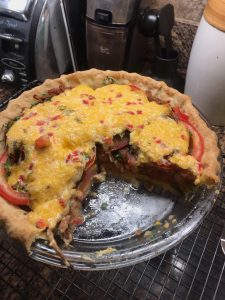I wrote this in 2013, while taking care of my best friend as she died from ovarian cancer. From time to time, I want to be reminded of the wisdom that arises in times of crisis.

The brochure from hospice inform me that as a dying person’s body winds down, appetite becomes erratic and diminishes. The sense of taste changes so that formerly favorite foods are no longer appealing. The person eats less when they do eat. Finally, many dying people refuse all food. This can be complicated because throughout human cultures, offering food is a way of expressing love. The dying person may continue to eat in order to please a loved one, but in the end the demands of the body prevail.
Besides nourishing our bodies, sometimes past the point of health and into diet-related diseases, food is laden with symbolic meaning. We celebrate with festive meals; we soothe ourselves with favorite treats from our childhood; we give candy to our sweethearts. Even the term “sweetheart” refers to sweetness, a taste, as do “honey” and other endearments. Taste and smell are the most basic, “primitive” senses, so our expressions of care go zing! right into the oldest portions of the brain.
For me, one of the most enjoyable aspects of world-building is creating different cuisines for each culture or social class, ethnic group or family. While it may be true that just about every cuisine has some version of pancake-rolled-around-filling, stew modeled on the canned stuff in American supermarkets shouts “generic fantasy!”
Just as every family seems to have their own special recipe for spaghetti sauce or meatloaf, you can devise variations on the same dish. Sometimes these variations might reflect notions about what is suitable food for people of different ages, different social status, or even genders (“manly meals” or “kiddy food” or salads-are-for-women). Even within these variations, not everyone has the same taste. Some may be innate (how cilantro tastes is genetically determined), or influenced by personal history (travel, associations with significant events or relationships) and health status.
Which brings me again to caring for a terminally ill friend, in particular providing meals for her. She jokes about taking a trip down the memory lane of the foods she’s enjoyed during her life. Her tastes have become nostalgic, erratic to the point of whimsical, but fleeting. Some of the things she’s asked for are cream of mushroom soup, watermelon, Stouffer’s macaroni and cheese, buttermilk biscuits from scratch (which I do know how to make), hot dogs with sauerkraut, salami, and vanilla ice cream with lemon sorbet for breakfast. No pickles with the ice cream, at least not yet, although she jokes about the food cravings of pregnancy. Life is indeed uncertain, so she eats dessert first.
The food comes with memories, of course. “Do you remember the time we ate this when we were students and…” or “I made this recipe while horse camping on Mt. Hood…” or “my father used to cook this for a special occasion…” I think the same is true for everyone, but the awareness that time is limited, that the number of times you will eat this dish or reminisce over the adventures that once accompanied it are not limitless, adds a special poignancy. As my friend’s appetite wanes, she eats less in amount and frequency. There’s a shift from the fullness of having eaten to the sensory pleasure of eating to the anticipation, the idea of that particular food. If there is a sense of re-visiting the past – comfort and celebration, adventure and sharing – there is also a gradual farewell.

 I made tomato pie yesterday–inspired by a post on Facebook’s “Not the NY Times Cooking Community” page. I had never heard of such a thing before, but I not only liked it a lot, but I have ideas on how to improve the recipe, which means that it will happen again. The idea is simple: make a pie shell. Put down a (fairly well-packed) layer of ripe tomatoes, followed by about a layer of caramelized onion, a scattering of crisp bacon bits, a quarter cup of chopped fresh herbs… then do it all over again. Then you top the whole thing with a mixture of shredded cheese, mayonnaise, and pimentos, and bake.
I made tomato pie yesterday–inspired by a post on Facebook’s “Not the NY Times Cooking Community” page. I had never heard of such a thing before, but I not only liked it a lot, but I have ideas on how to improve the recipe, which means that it will happen again. The idea is simple: make a pie shell. Put down a (fairly well-packed) layer of ripe tomatoes, followed by about a layer of caramelized onion, a scattering of crisp bacon bits, a quarter cup of chopped fresh herbs… then do it all over again. Then you top the whole thing with a mixture of shredded cheese, mayonnaise, and pimentos, and bake.